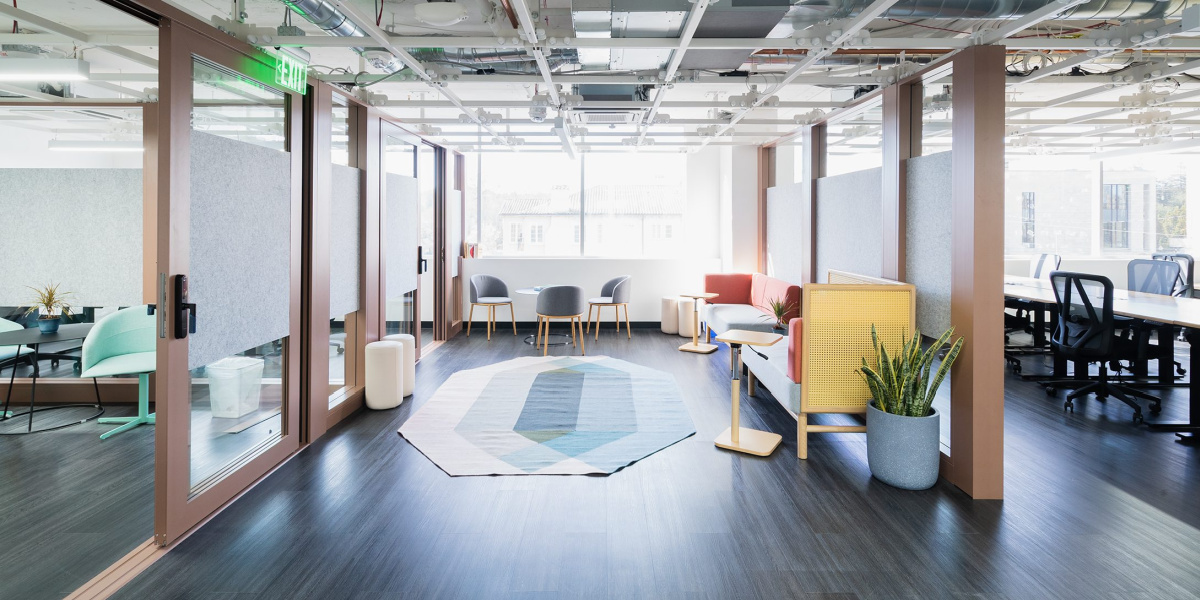How on-demand coworking spaces contribute to positive remote workplace culture
Sep 7, 2023
6 mins read
Employee Experience
Creating a positive hybrid or remote workplace culture requires deliberate effort along with a combination of strategies that often go beyond what companies may have deployed to engage their in-office teams.
One such strategy is bringing remote teams, in particular, together in person. Alysia Young, Head of Employee Engagement, Thumbtack, discussed this in a recent Flexspace interview.
“At Thumbtack, we’re virtual-first, but not virtual only. While our team members engage in most of their day-to-day work remotely, we are intentionally and boldly committed to ensuring meaningful in-person gatherings for both connection and collaboration as a key tenet of the overall employee experience.”
On-demand coworking spaces play a significant role in fostering and supporting a remote and hybrid workplace culture. That’s what coworking spaces, like NYC-based Luminary, have discovered.
“For distributed or remote teams, Luminary becomes their ‘unofficial office,’ offering a flexible alternative to a traditional office setting. It’s a way for employees to escape the isolation of home, reconnect with colleagues, and access productive spaces that go beyond basic desks and chairs.”
– Shai Card, Head of Memberships & Insights, Luminary
Let’s take a closer look at 3 ways on-demand coworking spaces contribute to positive remote workplace culture.
1. Flexibility
Now, you’ve probably seen no shortage of articles discussing the desire that many workers have for “flexibility” in the workplace. But for remote workers who do not have the option to return to the office in a hybrid-type arrangement, flexibility can be difficult to incorporate as part of your workplace culture.
That’s where on-demand coworking spaces come into play, offering a variety of flexibility to remote (and hybrid employees) who need the option of leaving their home office for a space that feels more like an in-office workspace. This lends itself to a better work-life balance, since working from home (even if workers have a decided home office) can often seep into personal time. Utilizing a space that’s outside one’s home provides for a clear separation between home and work.
But the day-to-day flexibility of taking in-person meetings with clients or customers, or utilizing a desk outside of their home is not the only aspect of flexibility that on-demand coworking spaces offer. For workers who travel for their work, on-demand coworking spaces allow them to find an office or meeting space wherever they might be located.
2. Community and Collaboration
One of the challenges of remote work can be the lack of social interaction. And even hybrid employees might experience this depending on the days that they’re in the office (which might differ from those of their colleagues). On-demand coworking spaces provide remote employees with a sense of community, which is a critical part of any workplace culture. The opportunity to engage in conversations with other remote workers as well as attend workshops or events can contribute to the sense of community that they might be missing.
Additionally, in-person collaboration with their own colleagues can be made possible with on-demand coworking spaces. For companies with remote employees living in close locales, they can provide the opportunity for those team members to get together in person on a weekly or monthly basis through the booking of an on-demand coworking space. Or, for companies that have truly distributed teams, utilizing these spaces for an all-hands work week can help bring their employees together in person thanks to access to amenities like conference or event spaces and meeting rooms.
3. Professionalism
According to a study conducted by Harvard Business Review and WeWork, “coworking spaces give some members a sense of professionalism and credibility that traditional remote working does not.” Echoing other research, workers who had the option to utilize a coworking space felt as though their work was taken more seriously. And they took their own work more seriously. When this is the case, the company and the worker benefit.
But that’s not all. This study also revealed that remote workers who utilized a coworking space were seen as more professional by potential clientele. And while some remote workers might not have the need to meet clients in person, having the option to book a meeting or conference room, or even a desk at an on-demand coworking space to offer the option of an in-person meeting shows a desired level of professionalism that reflects positively on the worker and the company.
As many companies navigate the transition from in-person teams to remote or hybrid settings, maintaining a positive remote workplace culture can be quite a challenge. With dedicated team members addressing the myriad challenges that might arise, another fantastic resource is access to on-demand coworking spaces to help bridge that gap. Flexspace works with company personnel, like workspace engagement and employee experience managers, to streamline bookings and budgets so that you can focus on what’s most important: creating a positive remote workplace culture with happy, engaged employees.
Pictured partner: Werqwise San Mateo

